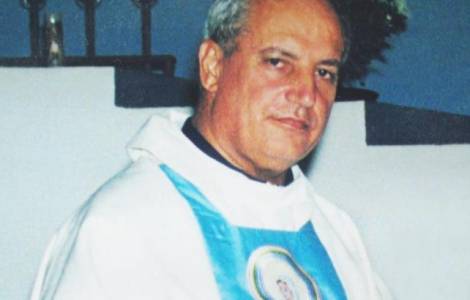
Diocese de São Luiz de Cáceres
São Paulo (Agenzia Fides) – "We have come to kill you because you bother us too much." These were the last words Father Nazareno Lanciotti heard before he was shot dead in his rectory in Jauru, in the Brazilian state of Mato Grosso, in February 2001. Twenty-four years later, Pope Francis, during an audience with the Prefect of the Dicastery for the Causes of Saints, Cardinal Marcello Semeraro, recognized his martyrdom.
The missionary of Roman origin, who for thirty years dedicated himself to proclaiming the Gospel in the forests and poorest regions of Brazil, and especially to protecting young people from the forms of slavery inflicted on them by pimps and drug traffickers, will therefore be proclaimed blessed.
Ordained a priest on June 29, 1966, at the age of 26, he held various pastoral roles in several parishes in Rome for five years. In 1972, after discovering Operation Mato Grosso, he chose, along with other young Italians, to dedicate himself to the mission. He left for South America and was entrusted with the care of the parish of Jauru, in the young diocese of Caceres, located in western Brazil, on the border with Bolivia.
"A difficult reality," as Father Enzo Gabrieli, postulator of the cause for canonization of Father Lanciotti, told Fides (see Fides, 22/3/2021), because it was "made up of many communities scattered in the forest." He did not lose heart and on the back of a mule he reached what would become, thanks to his passion and faith, a garden city around the parish church of Our Lady of Pilar. His deep devotion to the Virgin Mary, the centrality of the Eucharist in his missionary work, and his devotion to the Pope were at the origin of his work in Jauru, which quickly became the center of diocesan activities.
Among his first actions, Father Nazareno decided to build a sanatorium: Jauru was a very poor village, and the missionary noticed that many mothers died during childbirth and many children lost their lives due to common illnesses. The nearest hospital was 200 kilometers away, but over time, this sanatorium became a true Catholic hospital that today operates within the national network.
To caring for the body, Father Nazareno added care for the spirit, beginning the construction of a parish center and several chapels in the forest (he built about 40 in total) to assist the many faithful scattered throughout the villages. Next to the parish church, several "peripheral cells" were created where prayers were held (and still are held today) every day, even in the missionary's absence.
In 1987, he joined the Marian Movement of Priests and was appointed its national Director for Brazil the following year. In this capacity, he made frequent trips throughout Brazil to organize prayer cenacles with the Priests and families of the Movement.
In addition to building a home for the elderly, a school for younger people, and a minor Seminary (where the first ten local vocations were born), Lanciotti worked to curb the drug trade and prostitution. When the authorities decided to build a new dam to meet electricity needs, workers from all over Brazil and neighboring Bolivia flocked to the area. Drug and prostitution outlets proliferated. Every Saturday evening, he organized activities to entertain the young people and warn them of the dangers: "Eucharistic adoration, the rosary, and devotion to the Virgin will save you." These were words he also addressed to the workers who traveled daily to the dam construction site, passing through areas where drug traffickers ruled.
During those years, as the website of the Dicastery for the Causes of Saints states, "strong tensions arose among members of a Masonic lodge, opposed to Father Nazareno's actions."
He had also met with his young people on the afternoon of February 11, when he was killed in odium fidei. He was aware of the danger he was facing, and that evening, as it was raining, he said: "These are the tears of Heaven for me." In one passage, with a veil of sadness, almost of premonition, he said to those who were with him: "When you look for me, you will always find me at the foot of the tabernacle." And that is precisely where he was buried after his death.
The martyrdom took place shortly after 9 p.m., when two men with covered faces burst into the rectory where the missionary was dining with his collaborators and some guests. Pointing a gun at those present, they demanded money and asked where the safe was. They threatened everyone to stage a robbery gone wrong. Father Nazareno reassured them; he had offered to help, and those present had laid everything they had on them on the table. But the killers had only one goal.
They themselves revealed that they had been sent by certain local figures who were annoyed by the actions of the Church and the missionary. They staged a game of Russian roulette, but the bullet exploded against Father Nazareno by surprise.
The two killers fled, leaving the money on the table. The local police, whose headquarters were a few hundred meters from the rectory, did not arrive on the scene until the next day. Father Lanciotti was first taken to the hospital in Cuiabá, then to the Syro-Lebanese Hospital in São Paulo, where he died on February 22, 2001, at the age of 61.
His last words were to forgive his killers. It was around 6:00 a.m. on February 22, 2001, when Father Nazareno Lanciotti died after ten days of agony. His murder, far from being an unsuccessful robbery, "proves to have been premeditated. There was a perverse system in place prior to the murder, to which his pastoral work was hindering," states the Dicastery for the Causes of Saints, according to which "his murder immediately benefited from a solid and widespread reputation as a martyr, as well as a clear reputation for signs." (FB) (Agenzia Fides, 14/4/2025)